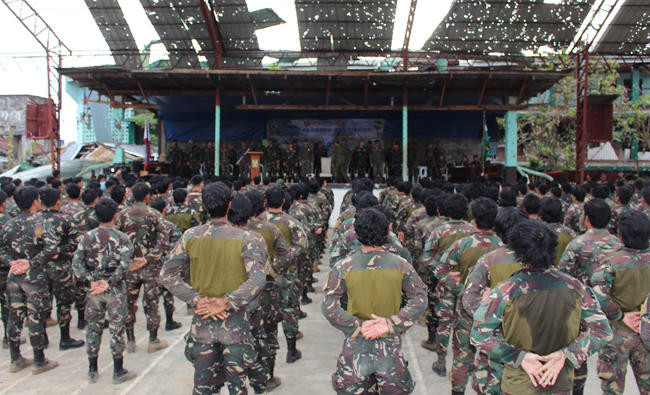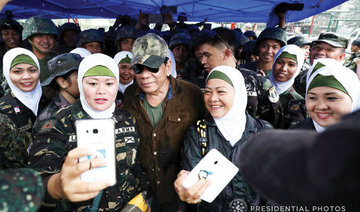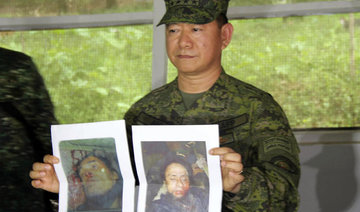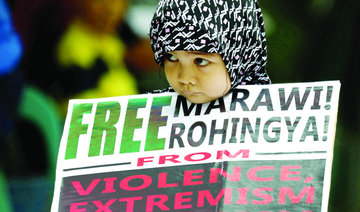CLARK FIELD: After five months of intense fighting between Philippine government security forces and the Daesh-backed Islamist Maute group in Marawi City, the government has declared victory.
Philippine Defense Secretary Delfin Lorenzana made the announcement at the sidelines of the Association of Southeast Asian Nations (ASEAN) Defense Ministers Meeting, which opened here on Monday.
Ministers from the 10 ASEAN member nations — the Philippines, Cambodia, Indonesia, Laos, Malaysia, Myanmar, Singapore, Thailand, Vietnam, and Brunei Darussalam — arranged a special meeting to discuss ongoing and future coordinated approaches to the growing security threats in Southeast Asia, particularly terrorism and violent extremism.
Lorenza announced the Philippine government’s victory in Marawi in a press conference, saying that combat operations in the country’s only Islamic city had been terminated, as the remaining Maute fighters had been killed.
“There are no more militants inside Marawi City,” Lorenzana said, confirming what President Rodrigo R. Duterte said last week when he declared the city free from terrorists.
Lorenzana claimed the victory meant the government had “defeated terrorism in the Philippines.”
“In crushing the most serious attempt thus far to export violent extremism and radicalism to the Philippines and the region, we have contributed to preventing its spread in Asia and (helped) to maintain global peace, stability, and security,” he said.
“While we (acknowledge) that these tactical and strategic gains will not annihilate the ideology completely, we declare that this achievement is a clear manifestation of how our regional cooperation can lead to a decisive advance against the proliferation of terrorism in this part of the world,” Lorenzana continued.
The defense secretary expressed his gratitude for the help extended by the US, Australia, Malaysia, Indonesia, Brunei, and Singapore, and China as government forces battled the militant forces.
Meanwhile, US Defense Secretary Jim Mattis praised the Philippines for its victory in Marawi.
Mattis is in the Philippines for the ADMM-Plus — a platform for ASEAN defense chiefs to engage their counterparts from Australia, China, India, Japan, New Zealand, South Korea, Russia, and the US.
“One of the first things I’m going to do is commend the Philippine military for liberating Marawi from the terrorists,” Mattis said in a statement released by the Pentagon. “It was a very tough fight, and I think the Philippine military sent a very strong message to the terrorists.”
Mattis added that his attendance was an opportunity to recognize ASEAN for 50 years of promoting peace and stability in Southeast Asia, and 40 years of cooperation with America.
“They have done a very good job of it,” he said.
Australian Defense Minister Marise Payne, who is also attending ADMM-Plus, met the crews of the two Australian Defense Force (ADF) AP-3C Orion aircraft which provided aerial surveillance support to the Philippine government’s successful operations against the Maute group in Marawi.
“We ask a lot of the men and women of the ADF and they answer without question and I particularly want to acknowledge that today,” she said. “I want to acknowledge the very real contribution that our ability to work with the government of the Philippines and the armed forces of the Philippines makes in terms of effective regional engagement.
“Australia and the Philippines have an extremely long, shared regional and military history. And our engagement in surveillance activity here has been an extension of that,” she continued. “An important extension of that.”
Philippines declares victory over Daesh in Marawi
Philippines declares victory over Daesh in Marawi

South Korea’s Yoon will not attend first impeachment hearing

- Yoon Suk Yeol has been holed up in the presidential residence and protected by an elite guard force
- The Constitutional Court has scheduled five trial dates spanning January 14 to February 4
Yoon has been holed up in the presidential residence and protected by an elite guard force since being suspended and impeached last month, following a short-lived declaration of martial law that plunged the country into political chaos.
He has refused to meet prosecutors and investigators and his presidential guard unit thwarted an attempt to arrest him following a tense, hours-long standoff earlier this month.
The Constitutional Court has scheduled five trial dates spanning January 14 to February 4, which will proceed in his absence if he does not attend.
“Concerns about safety and potential incidents have arisen. Therefore, the President will not be able to attend the trial on January 14,” lawyer Yoon Kab-keun said in a statement sent to AFP.
“The President is willing to appear at any time once safety issues are resolved.”
The court will decide whether to uphold his impeachment or restore him to office.
Separately, investigators seeking to question Yoon on insurrection charges linked to his ill-fated martial law declaration are preparing another arrest attempt.
His lawyers have repeatedly said an initial seven-day warrant and the new one they secured this week were both “unlawful.”
Investigators have kept secret the length of the new warrant, with local media reports saying it is longer than the previous seven days.
Rival protesters for and against Yoon have gathered almost daily in the South Korean capital since the crisis unfolded.
On Sunday more demonstrations were planned by rival camps outside Yoon’s residence and on the streets of Seoul — either calling for his impeachment to be declared invalid or for him to be detained immediately.
The president’s legal team say his guards remain on “high alert.”
Yoon would become the first sitting South Korean president to be arrested if investigators are able to detain him.
If convicted, he faces prison or even the death penalty.
A team of Corruption Investigation Office (CIO) officials and police are planning for the next attempt, which they said could be their last.
The CIO said anyone obstructing their attempt could be detained themselves and police reportedly held a meeting of top commanders on Friday to plan for the renewed effort.
Former Presidential Security Service (PSS) chief Park Chong-jun — who resigned on Friday and was automatically replaced by a more hard-line Yoon loyalist — told reporters there must be no bloodshed in any second arrest attempt.
He faced two days of questioning and did not explain his resignation.
“I am cooperating as diligently as possible with the authorities’ investigation,” he told reporters Saturday.
His replacement, acting PSS chief Kim Seong-hun, refused to turn up to a third summons on Saturday claiming he had to protect Yoon, opening him up to possible arrest.
Lee Jin-ha, head of the service’s security and safety division, was questioned on Saturday.
The National Office of Investigation, a police unit, sent a note to high-ranking police officials in Seoul requesting they prepare to mobilize 1,000 investigators for the fresh attempt, the Yonhap news agency reported.
As the crisis goes on Yoon’s ruling party has seen a bump in approval ratings.
A Gallup survey published Friday showed the People Power Party’s approval rating had risen to 34 percent from 24 percent three weeks ago.
Los Angeles wildfire death toll rises to 16

- Figure expected to rise as cadaver dogs search leveled neighborhoods and crews assess the devastation
- Authorities have established a center where people can report the missing
LOS ANGELES: The Los Angeles County medical examiner’s office confirmed the death toll from the wildfires ravaging the area has risen to 16.
The total of confirmed fatalities stands at 16 victims, and the cases remain under investigation. Five of the deaths were attributed to the Palisades Fire, and 11 resulted from the Eaton Fire, the coroner’s office said in a statement Saturday evening.
The previous number of confirmed fatalities was 11, but officials said they expected that figure to rise as cadaver dogs search leveled neighborhoods and crews assess the devastation. Authorities have established a center where people can report the missing.
Firefighters raced to cut off spreading wildfires before potentially strong winds return that could push the flames toward the world famous J. Paul Getty Museum and the University of California, Los Angeles, while new evacuation warnings left more homeowners on edge.
A fierce battle against the flames was underway in Mandeville Canyon, home to Arnold Schwarzenegger and other celebrities not far from the Pacific coast, where swooping helicopters dumped water as the blaze charged downhill. Firefighters on the ground used hoses in an attempt to beat back leaping flames as thick smoke blanketed the chaparral-covered hillside.
At a briefing, CalFire Operations Chief Christian Litz said a main focus Saturday would be the Palisades Fire burning in the canyon area, not far from the UCLA campus.
“We need to be aggressive out there,” Litz said.
County Supervisor Lindsey Horvath said the LA area “had another night of unimaginable terror and heartbreak, and even more Angelenos evacuated due to the northeast expansion of the Palisades Fire.”
Light breezes were fanning the flames, but the National Weather Service warned that strong Santa Ana winds — the nemesis of firefighters — could soon return. Those winds have been largely blamed for turning the wildfires into infernos that leveled entire neighborhoods around to city where there has been no significant rainfall in more than eight months.
The fire also was threatening to jump over Interstate 405 and into densely populated areas in the Hollywood Hills and San Fernando Valley.
The hunt for bodies continues
The grim work of sifting through the devastation continued Saturday, with teams conducting systematic grid searches with cadaver dogs, said Los Angeles County Sheriff Robert Luna. He said a family assistance center was being established in Pasadena, and he urged residents to abide by curfews.
“We have people driving up and around trying to get in just to look. Stay away,” he said.
The fires have consumed about 56 square miles (145 square kilometers), an area larger than San Francisco. Tens of thousands of people remained under evacuation orders and new evacuations were ordered Friday evening after a flare up on the eastern side of the Palisades Fire.
Since the fires first began Tuesday just north of downtown LA, they have burned more than 12,000 structures, a term that includes homes, apartment buildings, businesses, outbuildings and vehicles.
No cause has been determined for the largest fires, and early estimates indicate the wildfires could be the nation’s costliest ever. A preliminary estimate by AccuWeather put the damage and economic losses so far between $135 billion and $150 billion.
Rays of kindness amid the devastation
So many volunteers showed up to help at donation centers Saturday that some were being turned away. That was the case at a YMCA in the Koreatown neighborhood. By late morning, cars with would-be helpers were also being turned back from the Santa Anita Park horse racing track, where donations of necessities were being accepted.
At the racetrack Friday, people who lost their homes could be seen sifting through stacks of donated shirts, blankets and other household goods. Altadena resident Jose Luis Godinez said three homes occupied by more than a dozen of his family members were destroyed.
“Everything is gone,” he said, speaking in Spanish. “All my family lived in those three houses and now we have nothing.”
Officials warn against returning to burned homes
Some residents have been venturing back to see what can be salvaged after wildfires destroyed their homes, sifting through rubble for keepsakes. But officials on Saturday urged them to stay away, warning that the ash can contain lead, arsenic, asbestos and other harmful materials.
“If you’re kicking that stuff up, you’re breathing it in,” said Chris Thomas, a spokesman for the unified incident command at the Palisades Fire. “All of that stuff is toxic.”
Residents will be allowed to return, with protective gear, after damage teams have evaluated their properties, Thomas said.
City leadership accused of skimping on firefighting funds
Allegations of leadership failures and political blame have begun and so have investigations. Gov. Gavin Newsom on Friday ordered state officials to determine why a 117 million-gallon (440 million-liter) reservoir was out of service and some hydrants had run dry. Meanwhile, Los Angeles Fire Chief Kristin Crowley said city leadership failed her department by not providing enough money for firefighting. She also criticized the lack of water.
“When a firefighter comes up to a hydrant, we expect there’s going to be water,” she said.
Progress made on fighting the Eaton fire
Firefighters for the first time made progress Friday afternoon on the Eaton Fire north of Pasadena, which has burned more than 7,000 structures. Officials said most evacuation orders for the area had been lifted.
LA Mayor Karen Bass, who faces a critical test of her leadership as her city endures its greatest crisis in decades, said several smaller fires also were stopped.
The level of devastation is jarring even in a state that regularly confronts massive wildfires.
Scramble to shelter animals from Los Angeles wildfires

BURBANK, USA: When wildfires roared to life around Los Angeles, Janell Gruss had to leave immediately. But as the manager of a stable with 25 horses and other animals, she knew it was going to be complicated.
While some people just got in their cars and drove out of the danger zone, Gruss had to wrangle more than two dozen frightened horses, as embers swirled in 100-mile (160-kilometer) -an-hour winds.
“The last horse we had to get out of the barn... it was pretty bad,” Gruss told AFP at the Los Angeles Equestrian Center, where hundreds of animals have been brought this week.
“It was very smoky. It was dark. I couldn’t see where I was,” she recalled. “Both the horse and I were tripping over things, branches, whatever was on the ground.”
Gruss said coralling the animals was so challenging, she feared at one point she might not make it out alive.
“I thought I might have been one of those casualties,” she said, as tears rolled down her face.
“You hear about the person that goes in to get the last horse and doesn’t come out.”
More than 150,000 people have been forced from their homes by the huge blazes tearing through the city in a tragedy that has killed at least 16 people and changed the face of Los Angeles forever.
With so many people ordered to get out of the way of the advancing wildfires and needing to take their animals with them, capacity is strained.
“We’ve never seen anything like this,” said Jennie Nevin, director of communications for the Los Angeles Equestrian Center.
“The first night was very busy and chaotic. Lots of people coming from all over.”
Care for Animals
Dozens of people milled around the barns Saturday at the equestrian center, where donkeys, pigs and ponies have also found shelter.
Tarah Paige, a professional stuntwoman, had brought her three-year-old daughter to visit their pony Truffles and her miniature cow Cuddles — a TV star in her own right who has appeared on several programs.
“It’s been a whirlwind,” said Paige, for whom the equestrian center has been an oasis in the midst of an unimaginable catastrophe.
Nevin says there has been an outpouring of support and people offering their services to help care for the menagerie.
“It really takes a village,” she said. “It takes the community.”
Across the Los Angeles sprawl there are activists, veterinarians and volunteers working to rescue and care for animals made homeless in the tragedy, including some that were injured.
The Pasadena Humane Society received about 400 animals from Altadena, where the flames have already consumed more than 14,000 acres (5,600 hectares).
One of their patients is a five-day-old puppy that was found in the ruins of a building, its ears burned.
Annie Harvilicz, founder of the Animal Wellness Center, says she has hardly slept a wink all week.
As the fire spread through the upmarket Pacific Palisades, Harvilicz posted on Facebook that she was happy to take in animals.
The post “exploded,” she said, and dogs, cats and even a rabbit began arriving.
With flames still raging out of control, the calls for help have not stopped.
But, she thinks, even when the firefighters have quelled the blaze, the slow-motion tragedy will roll on.
“There’s gonna be more pets found, more pets injured, with smoke inhalation and burns that we’re gonna start to discover as some of the fire recedes,” she said.
“This is just the beginning.”
South Korea confirms Ukraine captured 2 North Korean soldiers

- One of the captured soldiers revealed during interrogation that North Korean forces had experienced “significant losses during battle,” South Korea’s National Intelligence Service says
SEOUL: South Korea’s National Intelligence Service (NIS) said Sunday it confirmed Ukraine captured two wounded North Korean soldiers this week in Russia, after Ukrainian President Volodymyr Zelensky said they were being questioned.
“The NIS, through real-time cooperation with Ukraine’s intelligence agency (SBU) has identified battlefield situations, including the capture of North Korean soldiers, and confirmed that the Ukrainian military captured two North Korean soldiers on January 9 in the Kursk battlefield in Russia,” the NIS said in a statement.
Kyiv, the United States and South Korea have accused nuclear-armed North Korea of sending more than 10,000 soldiers to help Russia fight Ukraine.
Kyiv on Saturday did not present direct evidence that the captured men were North Korean and AFP was unable to independently verify their nationality.
But the South Korean confirmation adds weight to Kyiv’s account, while neither Russia nor North Korea has reacted.
The NIS said one of the captured soldiers revealed during his interrogation that he received military training from Russian forces after arriving there in November.
“He initially believed he was being sent for training, realizing upon arrival in Russia that he had been deployed,” the NIS said.
The soldier said North Korean forces had experienced “significant losses during battle.”
The SBU also said the men had told interrogators they were experienced army soldiers, and one said he was sent to Russia for training, not to fight.
The NIS said it would continue to work with the SBU to share information on North Korean fighters in Ukraine.
Judge who blocked release of Trump report was ‘plainly’ wrong, special counsel tells appeals court

- The department is hoping to release in the coming days one part of its two-volume report focused on Trump’s efforts to undo the 2020 presidential election that he lost to Democrat Joe Biden
WASHINGTON: The Justice Department has asked a federal appeals court to move swiftly in reversing a judge’s order that had blocked the agency from releasing any part of special counsel Jack Smith’s investigative report on President-elect Donald Trump.
The emergency motion late Friday is the latest back and forth in a court dispute over whether any portion of Smith’s report can be made public before Trump takes office Jan. 20. The push to release it before Trump’s inauguration reflects concerns that the Justice Department under the Trump administration, which will include members of his personal legal team in key leadership roles, would be in position to prevent the report from coming to light.
The Justice Department revealed in a separate filing on Saturday that Smith resigned from the department on Friday after having submitted his Trump report to the attorney general. The move had been expected.
The department is hoping to release in the coming days one part of its two-volume report focused on Trump’s efforts to undo the 2020 presidential election that he lost to Democrat Joe Biden. The department has said it will not publicly disclose a separate volume — about Trump’s hoarding of classified documents at his Mar-a-Lago resort in Florida after he left the White House in January 2021 — as long as criminal proceedings against two of Trump’s co-defendants remain pending.
Both investigations resulted in indictments of Trump, though Smith’s team abandoned both cases in November after Trump’s election win. Smith cited Justice Department policy that bars the federal prosecution of a sitting president.
The Atlanta-based 11th US Circuit Court of Appeals denied an emergency defense bid Thursday to block the release of the election interference report, which covers Trump’s efforts before Capitol riot on Jan. 6, 2021, to undo the results of the 2020 election. The appeals court left in place an injunction from a Trump-appointed lower court judge, Aileen Cannon, that said none of the findings could be released until three days after the matter was resolved by the appeals court.
Lawyers for Trump’s co-defendants in the classified documents case, Trump valet Walt Nauta and Mar-a-Lago property manager Carlos De Oliveira, then asked Cannon to extend her injunction and to hold a hearing on the merits of their request to halt the release of the report.
The Justice Department responded late Friday by asking the appeals court to immediately lift Cannon’s injunction altogether. The filing noted that in addition to temporarily blocking the release of the election interference report, Cannon’s action also prevents officials from sharing the classified documents report privately with the leaders of the House and Senate Judiciary committees.
Cannon’s order is “plainly erroneous,” according to the department’s motion.
“The Attorney General is the Senate-confirmed head of the Department of Justice and is vested with the authority to supervise all officers and employees of the Department,” the Justice Department said. “The Attorney General thus has authority to decide whether to release an investigative report prepared by his subordinates.”
Justice Department regulations call for special counsels to produce reports at the conclusion of their work, and it’s customary for such documents to be made public no matter the subject.
William Barr, attorney general during Trump’s first term, released a special counsel report examining Russian interference in the 2016 US presidential election and potential ties to the Trump campaign.
Biden’s attorney general, Merrick Garland, has also released special counsel reports, including about Biden’s handling of classified information before Biden became president.




















